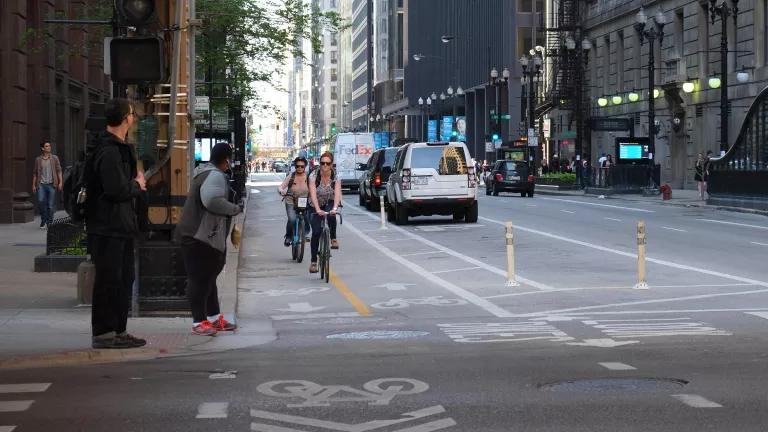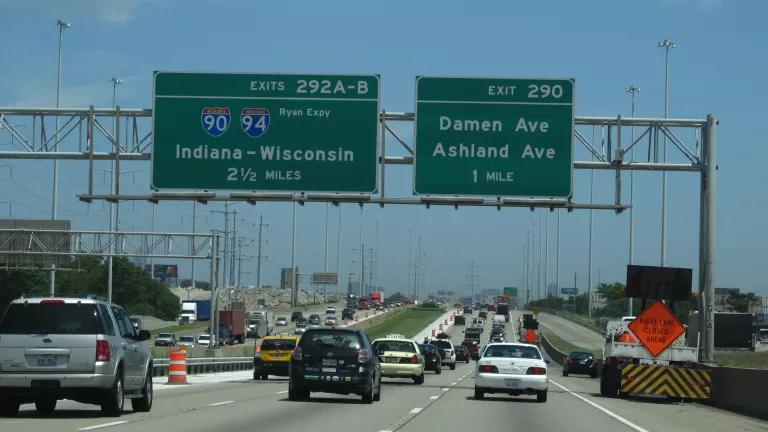National Scorecard Says Illinois Can Do Better on Transportation
A new scorecard from NRDC shows that Illinois is trailing behind its neighbors in building a clean and equitable transportation system.
This is the first part of a four-part blog series on transforming transportation in Illinois. Stay tuned for a more detailed look at the policy solutions needed to achieve a better transportation system for Illinoisans.
Illinois ranks 21st in the nation when it comes to creating and investing in a clean and equitable transportation system, according to a national scorecard released by NRDC. The scorecard evaluates a wide range of metrics and state policies related to regulations, investments, and state processes in vehicle electrification and state planning. Illinois is not yet a leader in fair transportation systems, even in the Midwest – scoring behind Minnesota and Wisconsin.
Transportation is the largest source of greenhouse gas emissions in the state, responsible for nearly a third of carbon emissions, more than the residential and industrial sectors combined.
This summer we saw the climate crisis directly impact daily lives in Illinois: wildfire smoke from Canadian forests kept us from breathing clean air, historic flash flooding led to millions of dollars in crop damage, and the hottest month on record put lives at risk. If we don’t begin to cut emissions rapidly, these disasters will only continue to worsen.
Illinois can take bold action in the near-term to steer our state towards a future where tailpipe emissions no longer pose a threat to public health, where access to reliable transportation is a right rather than a privilege, and where cleaner air and safer roads are the norm, not the exception.
State Investment in Transportation Infrastructure Should Reduce GHGs, Not Increase Them
For the state planning segment of the scorecard, Illinois earns just six out of 17 points when evaluated on how well its planning policies incorporate community participation in planning for transportation projects, equity criteria for its transportation investments, and greenhouse gas reduction targets.
Strong policies in these areas could be the backbone of an Illinois transportation system that supports clean air and public health, grows jobs in transportation, invests equitably in more options for accessing destinations across the state, and reduces the transportation costs for the average family.

Transportation accounts for the majority of GHG emissions in Illinois.
U.S. Energy Information Administration
In particular, greenhouse gas targets, like those set in Minnesota, can set the table for a common understanding about which kinds of transportation projects support climate progress, and which set us back. Enforceable targets will help to ensure that the billions of dollars of historic federal funding coming to Illinois communities through the state Department of Transportation are supporting climate, public health, and household budget-friendly investments, rather than more of the same expensive and polluting status quo.
Illinois does particularly well compared to other Midwest states in spending its federal highway dollars on maintenance, rather than highway expansions. This is a crucial step in reducing harmful emissions, rather than increasing them by continuing to expand highways.
Expand Transportation Choices Beyond Cars
When it comes to expanding transportation choices, Illinois scores a nine out of 34. Transit – buses and trains – provides a solution to the inequities created by our overreliance on car ownership. Not only are we facing a national crisis when it comes to traffic safety, there is also a significant cost burden when it comes to vehicle ownership.
With traffic congestion a concern for many travelers in the region, the majority of respondents in a recent survey cited transit investment as the key to addressing the issue. Our transit system has been undervalued and underfunded as public dollars have been channeled to roads, parking, and other infrastructure that supports cars over other options. The transit system now faces a looming operational budget crisis as federal COVID-19 relief dollars -- which had been a lifeline to transit agencies around the country, including the Chicago Transit Authority -- are set to run out.
Illinois must equitably expand transportation choices beyond cars by fully funding the operating budget of Illinois transit systems, finding alternatives to the gas tax, and reforming the governance structure of regional transit to ensure a coordinated, efficient, and integrated transit system. Rather than leading the race to the bottom with New York and Florida in terms of serious injuries and fatalities suffered by people walking and biking, we can emulate Minnesota and put more state funding per capita for transit, use federal funding on bicycle and pedestrian projects, and set goals for reducing vehicle miles traveled.
Zero-Emission Vehicles Are Needed Now
According to the scorecard, Illinois scored a 6.5 out of 31 for vehicle electrification, due in part to the continued reliance on dirty vehicles and lack of foundational clean vehicle regulations.
Fossil fuel-powered vehicles emit pollutants that lead to respiratory and cardiovascular diseases—including asthma, lung cancer, heart attacks, and strokes—and can cause premature death. A study by the Respiratory Health Association found that exhaust from diesel engines in Illinois will lead to more than 5,000 asthma attacks, nearly 200 heart attacks, and 416 premature deaths across the state in 2023.
Illinois must act quickly to adopt clean vehicle standards for both cars and trucks. These will bring billions of dollars in public health benefits, statewide economic benefits, and clean energy jobs to the state by establishing a clear market signal that Illinois is moving toward zero-emission transportation.
We need leadership from Governor Pritzker, Illinois Department of Transportation Secretary Omer Osman, and the Illinois General Assembly to reform how we plan, govern, and invest in our transportation system.





